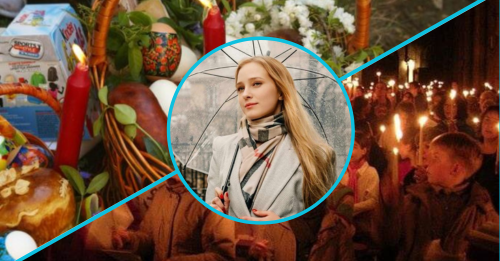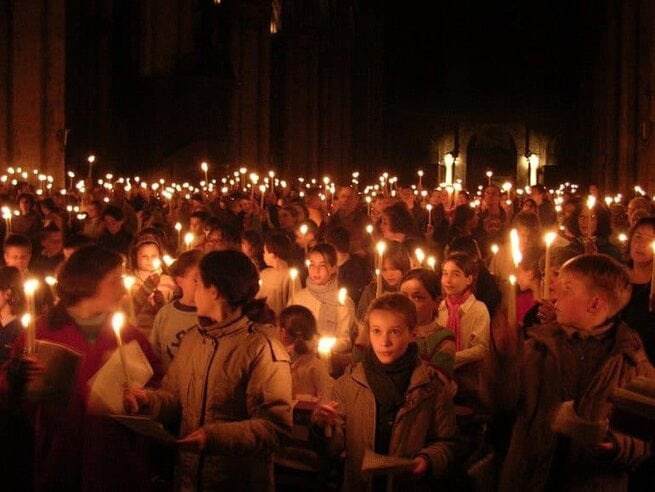A girl from Khust shared her impressions of Easter traditions, which may seem quite strange for Transcarpathians.

Anhelina Pavliy from Khust has been living in the city of love – Paris – for three years. The girl is studying in France and plans to open her own brand of cosmetic products after returning home. The Transcarpathians were already accustomed to European customs, although at first everything seemed too strange and illogical to her... For example, the fact that Easter eggs are brought to children not by godparents, but supposedly by two... and not from anywhere, but directly from Rome, and their kids must definitely collect them in baskets.
Angelina told more about how the French celebrate one of the largest religious holidays, what they feast on at a generously set table, how they have fun and what other unusual traditions exist there «Carpathian lens».
On Palm Sunday, rosemary is blessed
Angelina travels a lot throughout France. She assures that local students, as a rule, can afford such pleasure, because most of them earn extra money, and many trips are paid for by patrons who take care of certain educational institutions. Of course, we are talking about those who study well. So, in a few years, the Khust resident managed to visit different provinces and learn a lot of interesting things about life there.
"In general, I have visited many European cities, but I will only share French traditions. Some of them are common to the whole state, and some are unique to a particular region. For example, in some, as in Germany, for example, they believe that Easter eggs are brought by a rabbit, but in others they are convinced that this is exclusively the work of Easter bells. On churches, the bells fall silent on the evening of Holy Thursday. According to legend, at this time they go all the way to Rome to collect Easter eggs there. This tradition is said to have originated in the VI century. On Sunday night, these bells turn and scatter eggs over gardens and lawns. So in the morning, the children's task is to collect them. This is a very interesting activity, because the kids even compete to find the most. If the family lives in an apartment, then sweets should be found indoors. I would like to add that eggs are not traditional Easter eggs for us, but chocolate products and parents hide them in advance so that the children can work hard picking out sweet surprises. But it is not customary to paint, paint or somehow decorate ordinary chicken eggs or their shells at all. But confectioners know how to create exquisite chocolate masterpieces that are in great demand," the girl admitted.

According to the Transcarpathian, the French have been carefully preparing for Easter for a whole month. During this period, all kinds of fairs are held throughout the state, where you can buy both souvenirs and all kinds of delicious food.
"There is no such strict fast as we have here at all. Although there are many lean dishes in the local cuisine and they are incredibly tasty. On Palm Sunday, not willow branches are consecrated, but rosemary. This surprised me a lot. For Easter, streets, trees and houses are carefully decorated with colored garlands and ribbons. Everywhere the atmosphere is very sublime and majestic. The French most often give bells to each other, which are considered the main attribute of this holiday, a symbol of prolongation of life and fun," Angelina assures.
Khustyanka also claims that many people come to churches for Easter services in France, although they usually do not visit churches every week. But, as with us, no one visits each other either on Sunday or Monday, because Easter is considered a family holiday. However, families are happy to go on picnics somewhere in nature... Or just to the park, where they relax right on the lawns.
Instead of Easter cake, there is a baguette or an omelet
If not a single feast is complete without ham, that is, shovdar, then the highlight of the festive table for the French is baked lamb. In some regions, it can be replaced by a young chicken or chicken.
"No one bakes Easter cakes like we do. They can be replaced by a regular baguette with sausage and olives, or an omelet. For example, in the commune of Bessières, festivities are organized and a giant omelet is baked from 4-15 thousand eggs. All this is done in a giant pan, about 4 meters in diameter and in nature. Use 40 liters of oil for baking. The omelet is enough to feed 8 thousand people. By the way, everyone is offered to taste it. Slices of the dish are distributed free of charge. In addition, bakers bake one-and-a-half-meter loaves at the same time and treat everyone present," admits Anhelina Pavliy.

In general, as the Khustyanka convinces, each region of France has its own Easter dishes.
"In Alsace, for example, lambs are baked from dough. The dish is baked in a ceramic vessel, which every housewife should have. This tradition is still pre-Christian and marks the appearance of a young sun in the sky and the birth of lambs. It is not easy to bake such a lamb. First, beat the yolks with sugar for a long time, then the whites. Everything is carefully mixed to make the dough airy and very tender. In Limousin, on Palm Sunday, it is customary to bake brioche – a sweet triangular-shaped bun. It is believed to symbolize the Trinity. Although the roots of the dish are pagan and actually signified fertility. And nearby in Charente, sweet cookies with a hole in the middle are baked. For Easter, Gascons prepare turto – a cake that is sprinkled with sugar. On the island of Corsica, a sweet bun called a campanile is popular. This is a crown-shaped product with eggs inside. It is quite interesting that they are placed in the dough whole and with the shell. To taste, the bread is broken, the eggs are taken out, peeled, and so eaten. This usually happens as early as Monday. All these delicacies can be bought in confectioneries or at fairs, it is not necessary to bake at home," says the Transcarpathian.
Angelina was also surprised by other festive dishes.
"In the province of Berry, for example, eggs are baked with Easter pâté. Minced pork is inserted into the puff pastry along with the boiled eggs. With this dish, they then go to their neighbors and brag about who has it better decorated. And in Provence, on Good Friday, aioli is served – mayonnaise with garlic, seasoned with vegetables, fish, but without eggs. And on Easter Sunday, young lambs are baked. They are fried with young vegetables and local spices," she emphasizes.
Another strange custom, which exists on the French island of Corsica, surprised Angelina no less.
"There, Good Friday is celebrated in a rather strange way. The religious ceremony is held in an open area where many spectators are present. The volunteer dresses in old clothes, allows himself to be chained, and covers his face with a hood. He must stretch a huge cross through the whole city and fall with it three times, as Christ once fell. The action takes place in the city of Sartain. The path takes about 2 kilometers uphill. The identity of the sufferer is known only to one priest. He accepts applications from hundreds of applicants several months before this day and chooses one person. No one, of course, is crucified, but the spectacle is fascinating," the girl assures.

Also, as the Khustyanka emphasizes, in France, a lot of festivities are held before Easter, everyone has fun and knows how to do it sincerely.
"The French consider their country to be the cradle of Christianity, so they walk to the fullest. No one works on Sundays. Outside the tourist areas, even cafes and restaurants are closing. But there are all sorts of festivities, contests, entertainment, games, especially for children. Among the curiosities, I would also name the decoration of springs for Easter with garlands, ribbons, eggs and tree branches. Also, in many cities, a solemn knightly procession is organized, and in certain areas, an elegant carriage pulled by four white sprats drives through the streets and from there chocolate eggs are distributed to children," says the Transcarpathian resident.
In general, Angelina Pavliy considers Easter in France to be very interesting, and although the customs there are radically different from ours, they remain no less exciting, bright and incredibly colorful.
Author: Marina Aldon
Read also: "It's like our land": a Transcarpathian woman makes ancient amulets (PHOTOS)
Do you want to keep abreast of the latest events from the region and beyond? Subscribe to the Telegram channel "Voice of the Carpathians" and be the first to receive the latest information every day!
